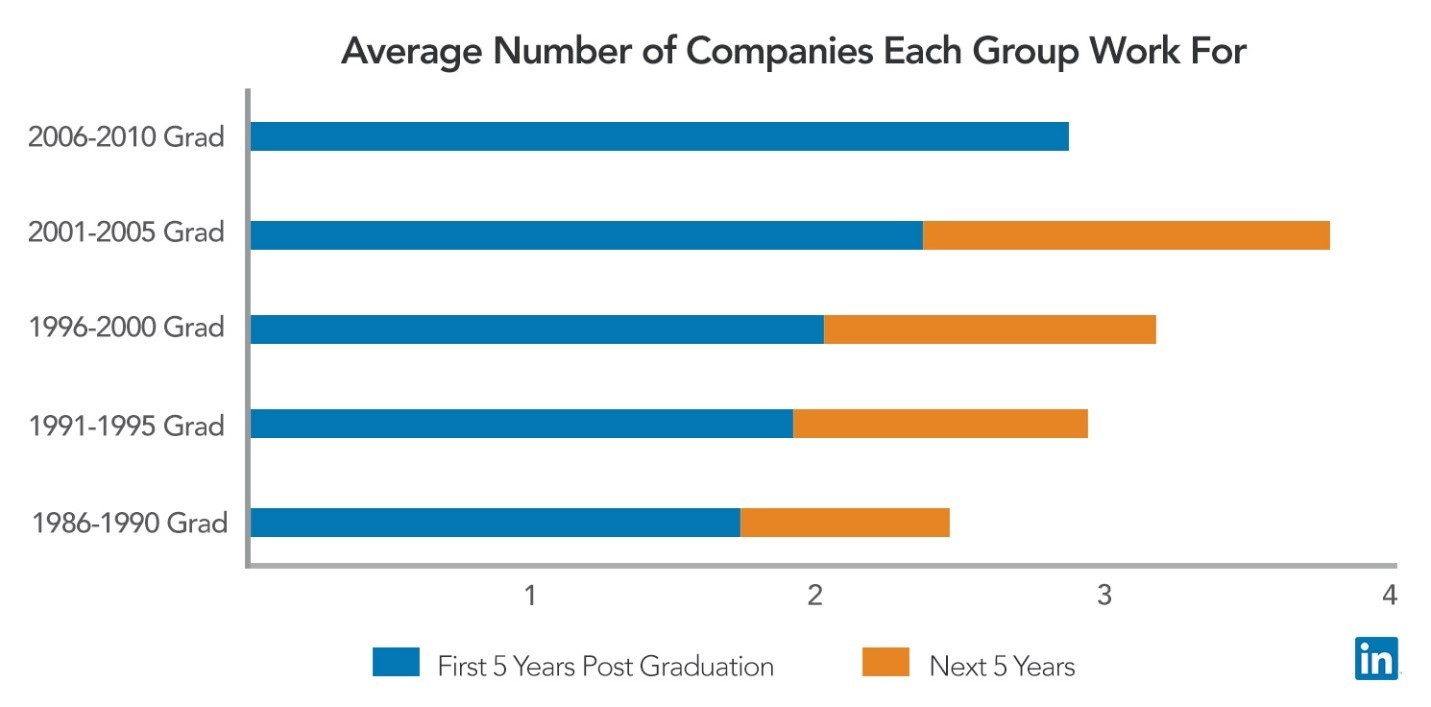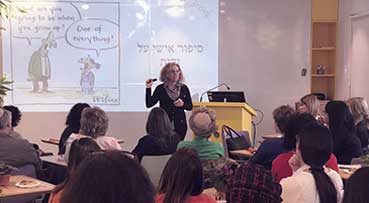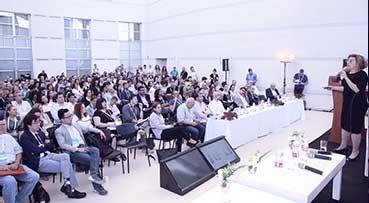It used to be easier to provide employees with a challenging career. When we hired people right after they completed their education we introduced them into entry level positions and then showed them the corporate ladder, which they could climb, year by year until retirement. We had time, we had clear career progressions and we had the tools to identify potential managers, leaders, experts. And we also knew how to identify those who reached that point, where there was no longer a fit. But in the new world of work emerging around us this career management model no longer works. This idea of a stable career, a steady climb up the corporate ladder, a clear view into the future, it no longer exists. Today’s Work Futures column examines how career management is transforming for people and for organizations.
There are a number of trends at work here, redefining career progression. Because organizations are removing layers of management in order to adapt to the changes and necessary speed, it is no longer possible to measure career progression as a climb up grades and roles and management hierarchy. To add to this, the younger generations are challenging the notion that their progression should mirror that of those who came before them. With the rapid changes in technology, many new employees are in fact hired for the skills they bring into the organization, for capabilities that the organization needs and its experienced employees do not have. As a result, those new hires we used to consider “inexperienced” are sometimes able to contribute in ways that experienced employees can’t, challenging the relationship between experience and career progression. On top of all these, we are also seeing a change in how we manage work. We used to work within organized organizational structures, where one worked with the same people on one’s team and under a clear management chain. That too is no longer the case and today we often conduct our work in various work teams where our team mates don’t necessarily report to the same manager and our manager doesn’t necessarily manage our work.
So how do you manage a career when that career is a sum of work experiences, in a world where people remain with a company or a role only a short time? In his book The Alliance: Managing Talent in the Networked Age Reid Hoffman, LinkedIn founding partner, addresses this dilemma in the form of a new contract between employer and employee. Since it is clear that in this new world of rapid changes, the previous contract no longer holds and there is no such thing as a long-term employment contract. LinkedIn data shows that college graduates today go through twice as many jobs in their first five years after graduation, compared to their counterparts thirty years ago. Hoffman recommends that we no longer think about employees as family but also not as completely non-committed free agents. Instead, he suggests we think of them as allies. Because in today’s organization, engaged employees help the organization do what it needs to remain relevant and succeed in business and in return the organization should help employees stay relevant and succeed in their own careers. And this requires both trust and a mutual commitment to invest in each other’s success.
This isn’t as farfetched as it sounds. In Israel , the first work experience for many of us begins in the army, where we start our work lives with a date for when we will leave this employer. In other words, we are hired with a termination date. So it is maybe not surprising that Jolt founder Roei Deutsch adopted this concept as an employment model for his organization, which he termed “Chapterships”. When we first met, Roei told me about the dilemma facing the young start-up, wanting to recruit the best but unable to pay top dollar and certainly not able to guarantee employment stability. But Roei also recognized that in careers, there are other, more meaningful considerations at work. That as we select new roles we do so with our own career aspirations in mind, considering the “why” this role suits our personal needs here and now. In many organizations today we do not acknowledge this underlying conversation, the considerations the employee makes about what they are trying to accomplish for their own personal career in taking a role. But Jolt took this very personal perspective on careers and turned it into the conversation to have with candidates and employees. And they didn’t stop there, based on this conversation, Jolt creates the employee compensation package. So as a start-up which cannot pay high wages and promise long term stability, the organization realizes that it can promise something even more important. It can ensure that while you work in this organization, it is as committed to supporting your career aspirations as you are to your work. And that includes training and personal development which many people consider as important, if not more important than pay and benefits. Take for example a talented programmer who knows that one day he or she will want to create their own start-up but to do that they must first work in such an organization, to understand how it operates from the inside. This employee would be willing to work for a lower salary at an organization that would allow him, in parallel to his job as a programmer, to experience a behind-the-scenes look at the startup operation, fundraising, meeting investors and customers. The same employee knows that there is a significant value to these experiences, a value which is not directly related to the programming job, but very relevant to his or her own personal development. And this value is more significant than pay. Incidentally, Jolt is as proud to share their Chapterships employment model as they are to share the story of the fascinating product they have created in the area of shared learning and lectures.
We have to realize that in the new world of work careers are not managed by the organization, they are made possible there, but managed by the employees themselves. In this age, where roles and professions disappear and new ones are being created, it is no longer possible to define a professional identity by belonging to a job or an organization. Careers now consists of a collection of knowledge, capabilities and experiences which, together, shape our professional identity. The shelf life of many of the career elements we used to consider our experience has significantly shortened. We have no choice but to continuously identify those which will no longer carry us forward and create our own opportunities for learning and experience in order to keep ourselves relevant for the future. Think of production workers, who need to learn to run new machines, of programmers, who need to learn new machine languages, of designers who need to learn to use new tools and work with 3D printers.
Careers are now the responsibility of employees but organizations can certainly help and those who will, will find themselves at an advantage. This begins by allowing employees access to learning, both in terms of time and budget. Many organizations create agreements with content providers and provide employees with free access to online courses. But it is more important to understand that most of the learning comes not from courses but from work experience. Therefore we see today more and more organizations enabling their employees temporary experiences in the form of project or assignments, but also more frequent role transitions, sometimes flexing role requirements. In this way, the organization shows that it is committed to the development of its employees and enables them to develop new abilities and learn on the job.
In this new world of work, where people join organizations for a limited and relatively short time, organizations need to create career strategies to accommodate quick ramps, the ability to team and contribute and, on the other side, to recognize when a role has run its course and it is time to help the employees find their next job within the organization, otherwise they will find them elsewhere. Those organizations wise enough to encourage continuous learning are allowing their employees to identify areas of development and get the experience needed to build their skills. Such organizations are likely to engage and retain good employees, compared to those who still believe they can keep doing what they did in the past.
Even if you try, you can’t stop the changes or their impact on careers. We have to manage our careers for more years of our lives, through shorter periods in roles and organizations, and under constant pressure to keep our skills up to date and adapt to any new technologies and the changes they bring to our industries, professions, roles and capabilities. It is important to remember that a career is something we build over time, with every change of role, opportunity to learn something new, and with every experience. And that these can occurs in what is called ” work ” but they can also be gained in our free time, however we choose to use it. And organizations that understand this will support their employees’ need to remain relevant and provide appropriate experiences. And if they don’t, they are likely to discover that employees will find their own opportunities for development and might leave, perhaps earlier than is necessary. And that would be a shame.
Published in Globes Israel Business Arena


![large-AX1A2125-2[1] large-AX1A2125-2[1]](https://dev.niritcohen.com/wp-content/uploads/elementor/thumbs/large-AX1A2125-21-pnzedcs72atx5aeurqytqdiihxixlq02re9mlz805s.jpg)






